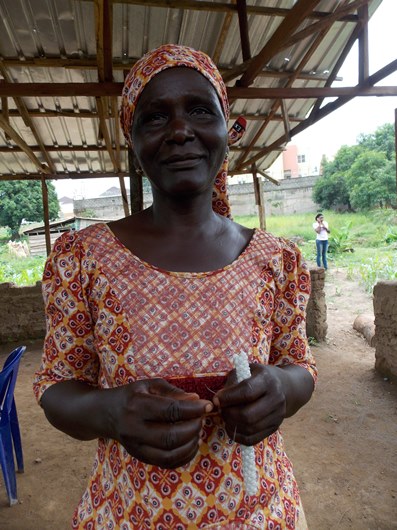|
Victim of Boko Haram finds new life in IDP camp
Wednesday, July 27, 2016
Martha mostly survives on charitable acts by individuals, organizations and Churches that provide food items, clothing, medical care and cash.
By Adie Vanessa
Offiong
ABUJA, Nigeria—Forty-nine-year-old Martha
John attends bead-making classes at the Durumi camp for Internally Displaced
Persons (IDPs) just outside the capital of Nigeria. The mother of eight escaped
a second Boko Haram attack on her village, Baga, Borno State two years ago.
She said: “In the crisis, my husband was separated from us.
After three days of travel by foot and eventually, by car, we arrived Abuja. It
was here, I learned he had fled to Cameroon.
We spoke for the first time two months ago. We haven’t spoken again since
then.”
This is not the only separation she is dealing with—some of
her children are also separated from her.
“It was difficult when I had to let four of my children join
the IDP camp in Benin City, where I learned they could continue with their
education,” she said.

About seven hours’ drive away, Martha’s children have to survive
on donations. “It’s been almost one year since I last saw them. We communicate on
the telephone,” she said, managing a smile.
Martha mostly survives on charitable acts by individuals,
organizations and Churches that provide food items, clothing, medical care and
cash. She also engages in subsistence farming, growing vegetables and crops
which she sells and feeds on.
She enrolled at the Marian Centre, which assists vulnerable
females living in IDP camps in Abuja, set up by Sister Anne Falola, of the
Congregation of Our Lady of Apostles congregation that is based in the Archdiocese
of Abuja.
Settled into her new life as an IDP, Martha is happy to
explore her creative side which didn’t exist before now.
“I have never had to learn anything like this [bead-making].
Women from my area usually farm or raise families. I am happy to have the
opportunity to learn these things rather than sit at home as I mostly did,”
Martha said.
Showing off her newly acquired skill—stringing beads for
necklaces—an excited Martha displayed her almost finished piece of jewelry:
“See what I have done. I started this yesterday and I have almost finished it.”
When asked how much she would sell it, her response was:
“No! I am keeping it for myself. Can’t you see how it looks and how long it has
taken me to make it? After this, I will make the ones for sale.”
For Martha it isn’t about being the best or being perfect in
the group of women whose stories are hardly different from hers.
“I am simply happy to have something to look forward to
daily; to be able to engage my mind, my hands and cause my head to think
creatively. This takes away any feeling of depression or loss and the lack of a
husband’s support at a time like this,” the now emboldened Martha said.
“If I didn’t have this, I don’t know what I would have done
with myself. You have to see through my heart to understand what I mean,” she
said, her eyes hardly betraying the depth of her thoughts.
Aid to the Church in Need supports a number of initiatives
to help victims of Boko Haram rebuild their lives. The international Catholic
charity also is funding the reconstruction of dozens of parish churches and
other church properties in the Diocese of Maiduguri, which has been hardest hit
by Boko Haram.
Martha John; ACN photo by Adie Vanessa Offiong
|